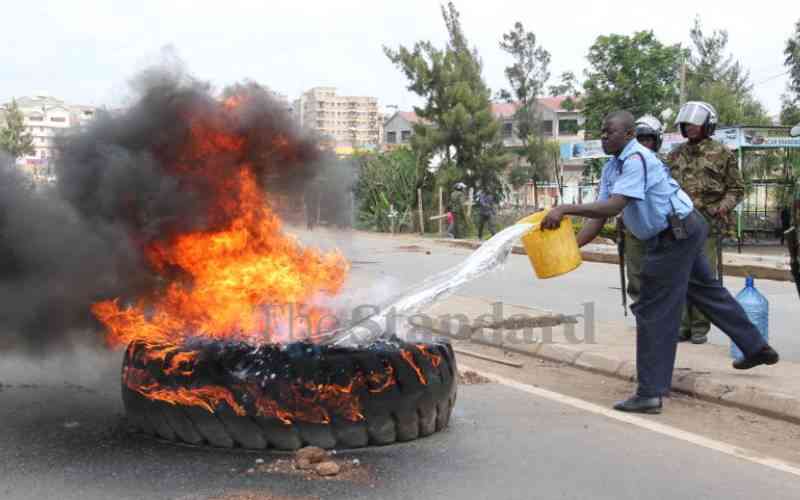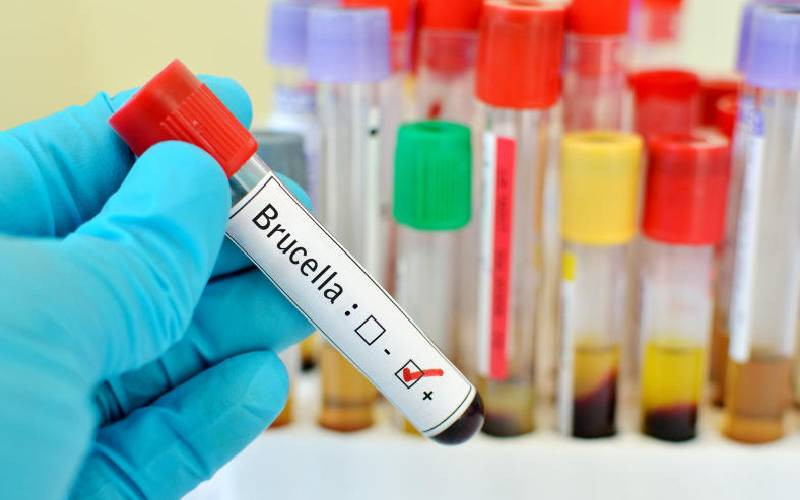
Uncontrolled use of tear gas and burning of tyres releases pollutants that affect the air, soil and water bodies. The impact affects both human and the environment.
The pollutants' health effects and impact depend on the length and degree of exposure.
Though the clinical health significance of tear gas use is uncommon, the gas is believed to be a collection of chemicals capable of causing eye problems such as irritation (itching and burning), temporary blindness, nerve damage, cataracts, hemorrhages, and corneal erosion. It is also linked to skin irritation, pain/itching, allergic dermatitis, redness, and blisters. The associated respiratory and gastrointestinal problems range from nose, throat, and lung irritation to coughing, nausea, vomiting, chest tightness, and troubled breathing among others.
Open tyre burning causes emissions, both criteria and non-criteria pollutants, that are harmful to public health. Criteria pollutants include particulate matter, sulfur dioxide, carbon monoxide, nitrogen oxides, and other volatile organic compounds while the non-criteria pollutants include hydrogen chloride, polynuclear aromatic hydrocarbons, and metals (mercury, vanadium, chromium, zinc cadmium, and nickel) among others.
According to public health, the pollutant particles are capable of translocating to the bloodstream through the lungs. Carbon Monoxide is an odorless gas that when inhaled, displaces oxygen in the bloodstream, damaging tissues and cells and can even lead to death.
Other effects of uncontrolled burning of tyres include skin and eye irritation, respiratory effects, cancer, neurological system issues, and even reproduction problems.

Uncontrolled tyre combustion releases carcinogenic compounds likely to cause genetic mutation more than the use of traditional wood combustion and coal-fired utilities. The most vulnerable members of society are foetuses, babies (through breast milk), children, asthmatics, the elderly, and other immune-suppressed persons.
The sulfur dioxide, carbon monoxide, and nitrogen oxides released have far-reaching environmental and climate change issues. The oxides released combine with rainwater to cause acid rain that harms aquatic life, harm and kills plants and animals as well as corrodes buildings, metals, monuments, and other structures.
- Reducing air pollution speeding up global warming climate crisis
- Climate: Experts call on countries to invest in early warning signs
- NGO hosts international symposium on climate change
- How traditional cooking claims 26,000 lives annually
Keep Reading
A collection of carbon dioxide, nitrous oxide, ozone, methane, chlorofluorocarbons, spray and gas aerosols, and other pollutants from the greenhouse gases leads to global warming, a phenomenon characterised by an increase in air temperatures near the earth's surface. The overall impact is the currently witnessed climate change, characterised by shrinking mountain glaciers and rising sea levels among others.
In order to aviate the above effects of open combustion of tyres, it requires a major intervention by regulators on both tear gas use and uncontrolled open combustion of tyres. There is also a need to promote sustainable scrap tyre management such as efficient tyre recycling to produce alternative energy/fuels and other rubber by-products.
- The writer is the Renewable Energy Officer, Ministry of Water, Energy, Environment, Climate Change and Natural Resources, Tana River County
 The Standard Group Plc is a multi-media organization with investments in media
platforms spanning newspaper print
operations, television, radio broadcasting, digital and online services. The
Standard Group is recognized as a
leading multi-media house in Kenya with a key influence in matters of national
and international interest.
The Standard Group Plc is a multi-media organization with investments in media
platforms spanning newspaper print
operations, television, radio broadcasting, digital and online services. The
Standard Group is recognized as a
leading multi-media house in Kenya with a key influence in matters of national
and international interest.











